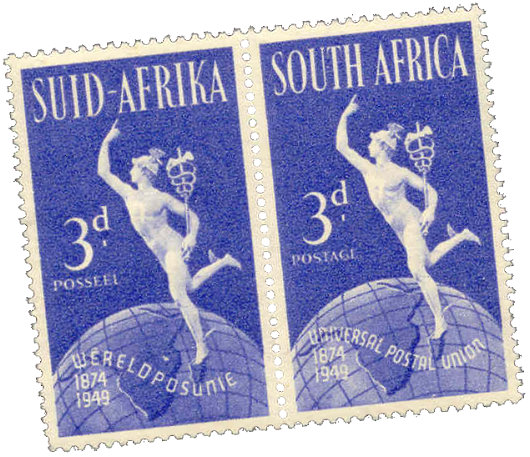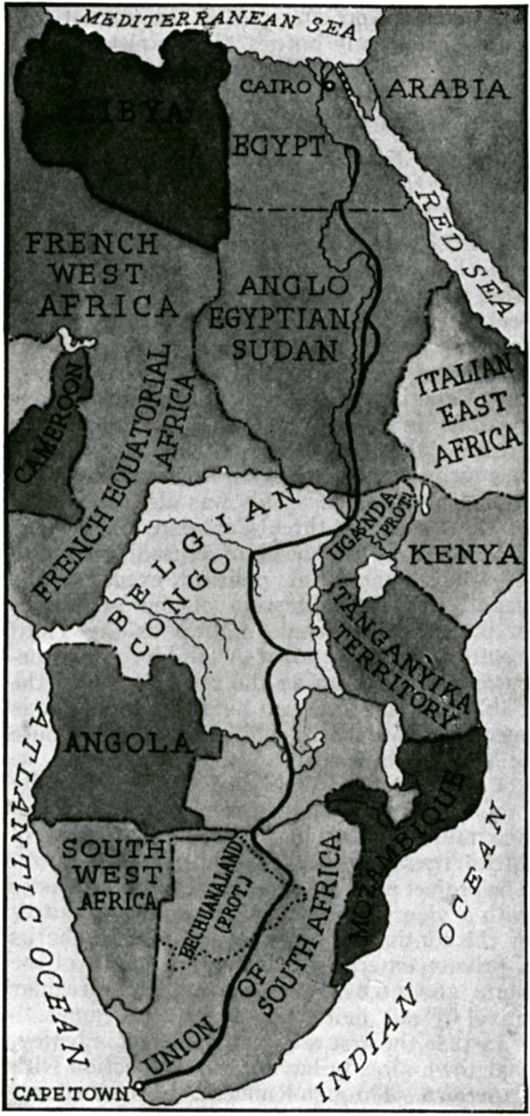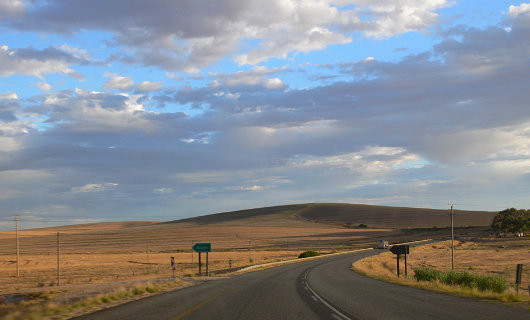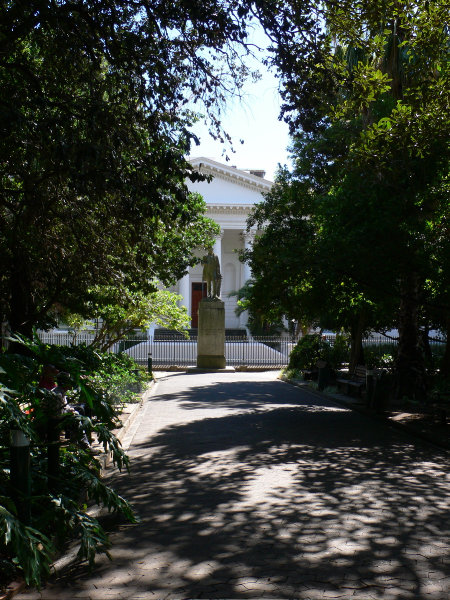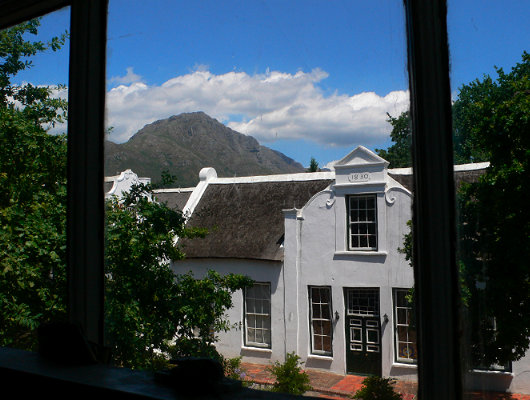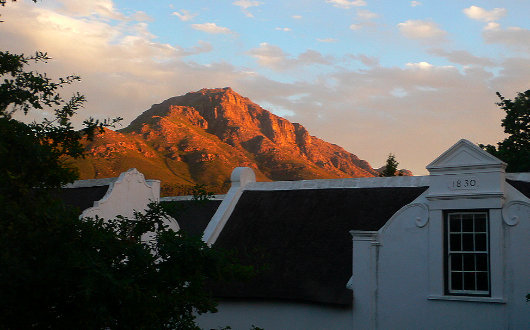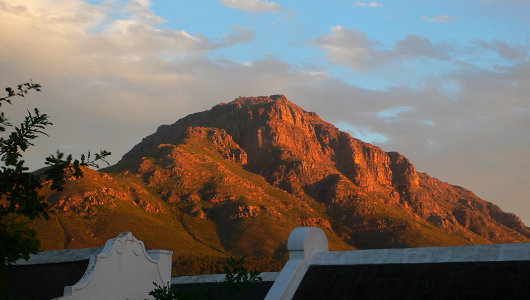South Africa
About Andrew Cusack
 Writer, web designer, etc.; born in New York; educated in Argentina, Scotland, and South Africa; now based in London.
Writer, web designer, etc.; born in New York; educated in Argentina, Scotland, and South Africa; now based in London. read more
News
Blogs
Reviews & Periodicals
Arts & Design
World
France
Mitteleuropa
Knickerbockers
Argentina
The Levant
Africa
Cape of Good Hope
Netherlands
Scandinavia
Québec
India
Muscovy
Germany
Academica
Zuma’s Day
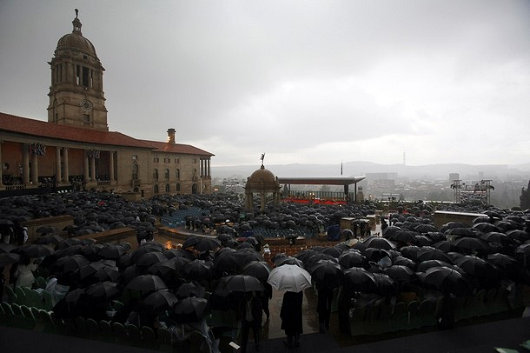
“PRAETORIA PHILADELPHIA” — Pretoria of Brotherly Love — was the formal name for the paramount of South Africa’s three capital cities. Pretoria, the jacarandastad, is home to the Executive; Cape Town, die moederstad, is home to the Parliament, and Bloemfontein, the “City of Roses”, is home to the High Court of Appeal. While the politics of government take place in Cape Town, its actual administration takes place in Pretoria, and all that flows forth from the stately Union Buildings that preside over the city from atop Meintjieskop. The Uniegebou is composed of two wings that come together in a semicircular amphiteatre, symbolizing the coming-together of Briton & Boer in the Union of South Africa. Designed by Sir Herbert Baker, Lutyens’ lieutenant in the building of New Delhi, some believe it to be his finest work.
Boers, Peter Simple, and Pith Helmets
Sometimes something rather interesting is right under your nose and you never even notice it. I read the Catholic Herald — the premier Catholic newspaper in the English-speaking world — every week and have been reading it since university days, but I have rarely read Stuart Reid’s “Charterhouse” column on the back page. A few recent perusals have exposed my foolishness for neglecting it. They are presented for your reading here.
(Of course, there has never been a columnist as brilliant as Peter Simple, whose works we have shown you in a series of installments.)
Charterhouse
by STUART REID
Everyone needs a secular hero or two, and one of mine is Rian Malan. In the Sunday Times at the weekend he had a very nice diary, in which he said that he liked Jacob Zuma, because the president-elect of South Africa had “old-fashioned views on stuff like law and order”.
Malan also said that it was a good time to be a Boer: “…as South Africa staggers towards its destiny, it’s white Left-liberals who are wailing about our government’s shortcomings. The Boers never expected any better, so we are generally immune to the gloom.”
The diary made my heart go out, once again, to the Boers. They are brave, honest, hard-working, courteous, old-fashioned and often God-fearing, with a weakness for the bottle. Plus they were on the right side in the Boer War and their women – sometimes their men too – are beautiful.
It’s good to be Prime Minister
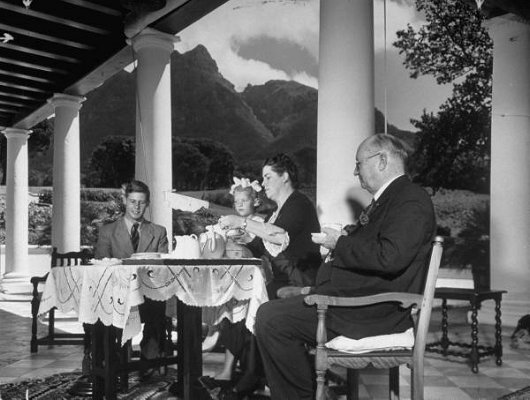
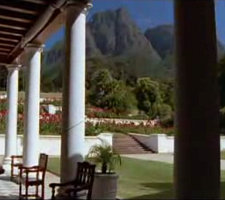 Daniel François Malan, fourth Prime Minister of South Africa, is seen here taking breakfast with his family on the verandah at Groote Schuur, the official residence of the PM. (At right, the same view today). Groote Schuur — literally “great barn” — was purchased by Cecil Rhodes and transformed into the paragon of the South African style of architecture by his architect Sir Herbert Baker. Foolishly, the office of Prime Minister was abolished in 1984, when the ridiculous 1984 tricameral constitution was adopted. Groote Schuur continued as the Cape residence of the State President of South Africa under P.W. Botha and F.W. De Klerk but when Nelson Mandela was elected he decided to make the neighbouring Westbrooke his official residence, renaming it Genadendal (“Valley of Grace”) after the oldest Moravian mission in South Africa. Groote Schuur is now a museum open by appointment, and unlived in.
Daniel François Malan, fourth Prime Minister of South Africa, is seen here taking breakfast with his family on the verandah at Groote Schuur, the official residence of the PM. (At right, the same view today). Groote Schuur — literally “great barn” — was purchased by Cecil Rhodes and transformed into the paragon of the South African style of architecture by his architect Sir Herbert Baker. Foolishly, the office of Prime Minister was abolished in 1984, when the ridiculous 1984 tricameral constitution was adopted. Groote Schuur continued as the Cape residence of the State President of South Africa under P.W. Botha and F.W. De Klerk but when Nelson Mandela was elected he decided to make the neighbouring Westbrooke his official residence, renaming it Genadendal (“Valley of Grace”) after the oldest Moravian mission in South Africa. Groote Schuur is now a museum open by appointment, and unlived in.
Betty’s Bay
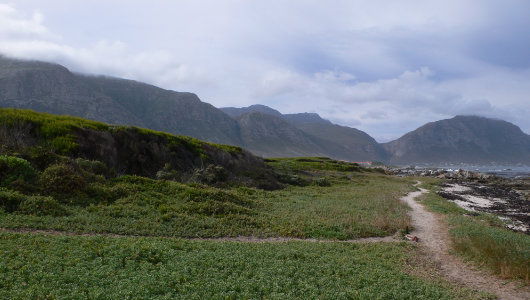
Travelling down the east side of False Bay, through the happy town of Rooiels, past Pringle Bay, and around Cape Hangklip sits the little village of Betty’s Bay. Nudged between the waters of the Indian Ocean and the rugged mountains of the Kogelberg, this is one of the most beautiful corners of the Cape. At the same time, it is just sixty miles (as the crow flies) from die moederstad itself — Cape Town. In days long since past, Betty’s Bay and the surrounding area of the Overberg were the hiding places for runaway slaves, sailors deserting their vessels, and smugglers of every kind. The Overberg takes its name because it is over the Hottentots Holland mountains from Cape Town — just outside the immediate purview of the earnest authorities in that swarming port, the “tavern of the seas”.
Wupperthal in die Wes-Kaap
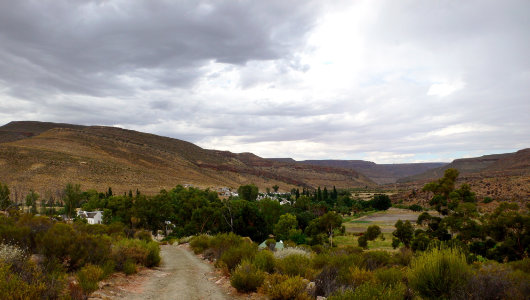
Deep in the Cedarberg, in the northern reaches of the Western Cape, there is a lovely little Moravian mission in a valley called Wupperthal. Unless you have a 4×4, there is just one road in and out of the valley, and even that road can be a bit tricky for conventional vehicles. Barefoot children, smiling and carefree, play in the streets beneath the avenue of eucalyptus that perfectly frames the beautiful church. Genadendal is the most famous of the Moravian missions, but Wupperthal was actually founded by Rhenish missionaries, before briefly becoming Dutch Reformed in the middle of the last century, and then taken over by the Moravians, or Herrnhuters as they are called in Afrikaans, after the Sorbian stronghold of the Unitas Fratrum.
Separation Anxiety
Fond of beer in swarthy nooks,
but happiest among his books.
Change happens very quickly these days, and it has always interested me that people born in the same year as me are (more or less) the youngest ones to remember life without the Internet. The younger siblings of friends have no experience, in particular, of being computer literate while not having the Internet. We, on the other hand, recall the tiny Macintosh “Classic” as well as the older machines with the green type on a black background from computer class in school. Computers were for typing things up, or else for games, and computer games were never of much interest in our household. Who could be bothered sitting in front of a monitor when you could have a waterfight with the neighboring kids? (The exception, for me, was SimCity 2000, in which you could be Robert Moses, Albert Speer, and a disastrous hurricane rolled into one.)
Then, of course, came the wonderful World Wide Web. You could send emails, though for the life of me I can’t remember sending any in the first years of our family getting Internet access. When first introduced to yahoo.com, I instantly dismissed it, for I was convinced that nothing of any import could be known by the name of “Yahoo.” Still, we kids couldn’t get enough of the Internet. I was primarily a news & history junkie, seeking to learn of events in far-off lands that I had spent hours discovering in encyclopediae and while pouring over giant maps laid out on the dining-room table or the living-room floor. Every National Geographic that arrived having the red text in the yellow margin that indicated a map was enclosed was received like a gift from the heavens and added to my collection—which included the Canadian provinces, the Soviet Union, Indonesia, the British Isles (when still called so), and of course the precious World Map. Most memorable was when, just a short while after the fall of the Iron Curtain, National Geographic released a map of “The New Europe” with a dozen new countries added and borders changed.
While books were essential during our childhood, the Internet, however, remained a mere sideshow, a curious novelty for occasional use. Then—gradually, sometime, somehow—it became an indispensable part of existence. Essays at school were completed with the help of Internet research, the great quest to decide where to go to college would have been impossible without all those .edu & .ac.uk websites wooing prospective undergraduates, and then the year I started university was marked by the advent of something called Wikipedia.
I found, contrary to the expectations of some, that the Internet did not compete with my love of books, but rather complemented it. One could “google” second-hand bookshops in New York, London, and Edinburgh and then pay them a visit. There, ancient tomes and beautiful editions could be found and, judiciously, purchased. And while reading those tomes, various ideas and inspirations would spring to mind which would cause one to place down the book to the left and turn to the laptop on the right and find out more about any given subject. If Paddy Leigh Fermour mentions a castle in Bohemia or Hungary, you have but to type out the correct spelling, click a button, and reams of up-to-date information about it are at your fingertips. And of course there is purchasing old books online, and thereby expanding one’s library: a particular joy.
But during my university years, spent between home in New York and uni in Scotland, my library was rent in twain. The age of manservants and transatlantic ocean liners having passed, I could not bring my entire collection of books wherever I went, but frequent travel between the two homes of my collection lessened the impact of not having “that” book immediately at hand.
The problem now is that I find myself in South Africa, separated from both my precious library (now consolidated in New York) and the Internet. This part of the world is a strange mix between Palo Alto and Lubumbashi, and the level of Internet connectivity is very poor. Here in Stellenbosch, luxurious vineyards dot the landscape, and lazy cafés sit under the shade of the oak-lined streets, but most Internet service providers charge for use by megabyte downloaded. To those of us accustomed to the easy broadband access of most of the northern hemisphere, it is the galling equivalent of being handed a reed and a wet clay tablet and being asked to send an email in cuneiform (or “stuur ‘n e-pos in spykersrif” as it would be in Afrikaans). I am ostensibly a student here, but even our university—which sent the first African satellite into space—charges its students for the Internet per megabyte used. I looked into getting the Internet installed at home—a flat in an old whitewashed Dutch house in the middle of town—but the widely recommended snowball.co.za is prohibitively expensive for a poverty-stricken young amateur scholar such as yours truly.
Luckily there is a little café just around the corner that only charges R17 for an hour’s wireless Internet, no megabyte limit, peer-to-peer software and mass media downloading prohibited (fair enough). Cheap as chips, but then only during their working hours, and completely ill-suited to my Internet-browsing sentiment. Gone the quick check-of-the-email at the very dawn of day. Gone the ability to google some ancient German dynasty that surfaced amidst a late night’s readings. Needless to say andrewcusack.com—my Internet repository of miscellaneous and somewhat unrelated information—has fallen by the wayside as well. I can purchase an hour’s cheap Internet, but an hour is not what I want. A rushed feeling pervades an hour’s purchased Internet. I want five minutes here, ten minutes there, two minutes elsewhere, and every now and then an hour or two for some knee-deep research.
So should any ambitious techies of Silicon Valley be readers of Taki’s Magazine, set your sights on South Africa. There is a fortune to be made if someone can make good Internet as cheap and accessible as back in the States, but be warned: it might take a good deal more cunning to get things done on African time.
[First published in Taki’s Magazine]
Some Afrikaners
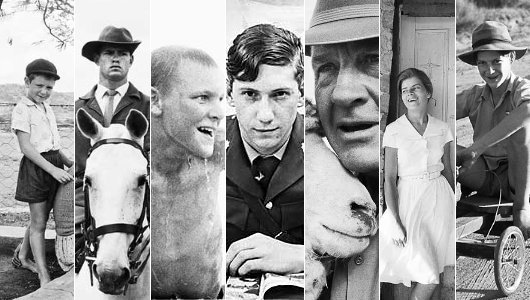
“In my father’s shop,” writes the photographer David Goldblatt, “serving Afrikaners, I found, almost in spite of myself, that I liked many of them and, to my surprise, that I was beginning to enjoy the language. There was a warm straightforwardness and an earthiness in many of these people that was richly and idiomatically expressed in their speech. And, although I have never advanced beyond being able to speak a sort of kombuistaal, I delighted in our conversations. Yet, withal, I was very aware that not only were most of these people Nationalists, strong supporters of the Party and its policies, but that many were racist in their very blood. Although anti-Semitism was now seldom overt, they made no secret of their attitude to blacks, who at best were children in need of guidance and correction, at worst sub-human. I was much troubled by the contradictory feelings of liking, revulsion, and fear that these Afrikaner encounters aroused in me and felt the need somehow to come closer to these lives and to probe their meaning for me. I wanted to do this with the camera.
“I had begun to use the camera long before this in a socially conscious way. And so I began to explore working-class Afrikaner life in our district. I drove out to the kleinhoewes around the town. I would stop and ask people if I might do some portraits of them or spend time with them while they went about whatever they were doing. In this way I became intimate with some of the qualities of everyday Afrikaner life in these places, and with some of its deeply embedded contradictions.
“An old man sits for me. A black child comes and stands next to him, looking at me with curiosity. The man turns and says to the child, ‘Ja, wat maak jy hier, jou swart vuilgoed?‘ (Yes, what are you doing here, you black rubbish?), the insult meant and yet said with affection. How is this possible? I don’t know. But the contradiction was eloquent of much that I found in the relationship between rural and working-class Afrikaners and blacks: an often comfortable, affectionate, even physical intimacy seldom seen in the ‘liberal’ circles in which I moved, and yet, simultaneously, a deep contempt and fear of blacks. …
“Travelling through vast, sparsely populated parts of the country with my camera became a major part of my life at that time. I think that our landscape is an essential ingredient in any attempt at understanding not just the Afrikaner but all of us here. We have shaped the land and the land has shaped us. Often the land was unforgivingly harsh. Yet, the harsher the landscape the stronger the Afrikaners’ sense of belonging seemed to be. Many of the people whom I met in the course of those trips had a rootedness in the land of which I was very envious. Envious in the sense that I couldn’t claim 300 years of ancestry in this country. Yet, increasingly, I felt viscerally bonded to it.”
The Groote Kerk
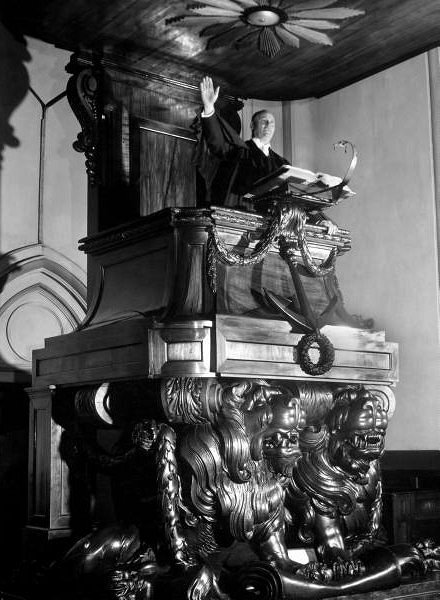
Dr. van der Merwe, moderator of the Dutch Reformed Church, poses in the splendidly carved pulpit of the Groote Kerk in Cape Town.
South Africa
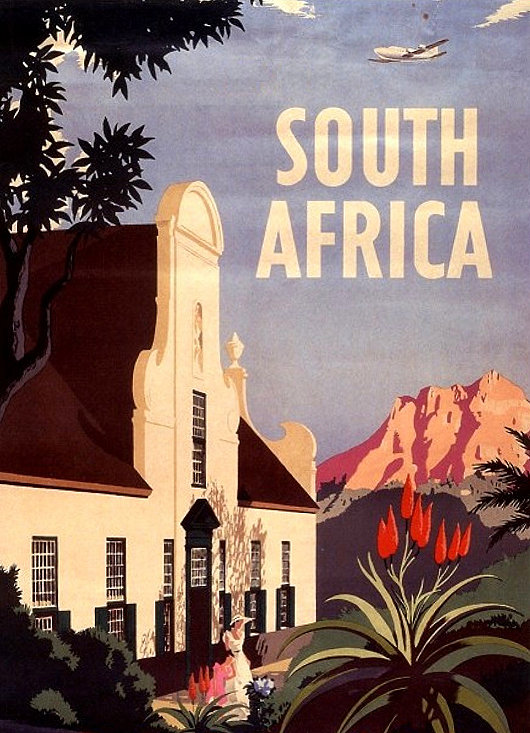
I‘m afraid that blogging may be lighter than usual for the next few months, as I have gone into voluntary exile in South Africa. Internet access can be a bit tricky deep in the verdant winelands of the Western Cape, but I will certainly endeavour to send a few updates, not to mention some of the usual variety of posts (a number of which are currently cooking in the oven). It’s a rather handsome town I’m in, as this page shows.
The South African Fleet Review
Africa’s oldest navy parades its newest frigates
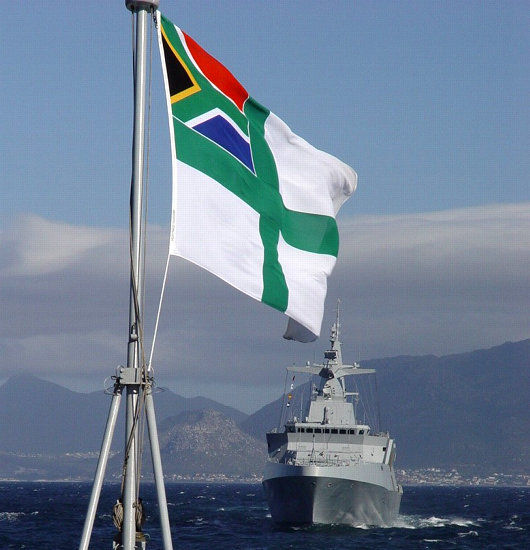
Fleet reviews are not very common occurrences. According to legend, the first fleet review took place when King Henry VIII on a whim gave the order to assemble his navy’s ships as he wanted “to see the fleet together”. On that occasion, the omnivorous monarch was rowed from vessel to vessel and enjoyed a repast on each. The tradition of the monarch reviewing the fleet continued, and usually took place to commemorate the coronation, to welcome a visiting monarch, or to commemorate some other event or occasion of great import.
Since the time of George III, British fleet reviews have typically taken place at Spithead between Portsmouth and the Isle of Wight. The 1814 review celebrating the Treaty of Paris was the last to be composed of only sailing ships, and included fifteen ships of the line and thirty-one frigates: “the tremendous naval armaments which has swept from the ocean the fleets of France and Spain and secured to Britain the domain of the sea”. The 1937 Coronation Fleet Review was made famous by the BBC radio commentary given by Lieutenant-Commander Thomas Woodrooffe. The retired naval officer had met up with a number of chums from his more sea-worthy days in a pub before the broadcast. Woodrooffe’s commentary was so incoherent that he was taken off the air within a couple of minutes; as the fleet was specially illuminated in the evening, Lt.-Cdr. Woodrooffe continually repeated “the Fleet’s lit up”; “lit up” also being a euphemism at the time for being drunk.
Yet another reason to love the Boers
“Oom Paul” Kruger’s thoughts on the circumnavigation of the globe
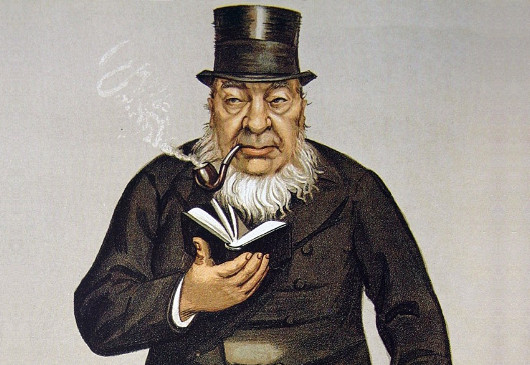
Joshua Slocum was a native of Nova Scotia who became an adventurer, seaman, and writer of some reknown in his time, and is perhaps best known both for his mysterious death and for being the first person to single-handedly circumnavigate the planet. Capt. Slocum published his memoirs of this trip in his 1899 book, Sailing Alone Across the World and one of the delightful little tales relayed is of the Captain’s docking at Durban in Natal and his journey inland to Pretoria in the Transvaal:
At Pretoria I met Mr. Kruger, the Transvaal president. His Excellency received me cordially enough; but my friend Judge Beyers, the gentleman who presented me, by mentioning that I was on a voyage around the world, unwittingly gave great offense to the venerable statesman, which we both regretted deeply.
Mr. Kruger corrected the judge rather sharply, reminding him that the world is flat. “You don’t mean round the world,” said the president; “it is impossible! You mean in the world. Impossible!” he said, “impossible!” and not another word did he utter either to the judge or to me. The judge looked at me and I looked at the judge, who should have known his ground, so to speak, and Mr. Kruger glowered at us both.
My friend the judge seemed embarrassed, but I was delighted; the incident pleased me more than anything else that could have happened. It was a nugget of information quarried out of Oom Paul, some of whose sayings are famous. Of the English he said, “They took first my coat and then my trousers.” He also said, “Dynamite is the corner-stone of the South African Republic.” Only unthinking people call President Kruger dull.
— Chapter XVIII, Sailing Alone Around the World, by Joshua Slocum
I agree entirely with Capt. Slocum’s conclusion.
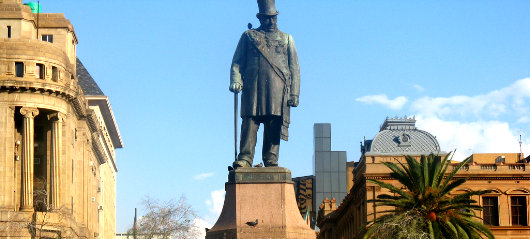
While his views on geography may not have been strictly orthodox, President Kruger is honored with an imposing monument in the Kerkplein, the central square of Pretoria, now the capital of all South Africa, not just the Transvaal. The President’s statue rests in an enviable position between two of the most handsome edifices in all of South Africa:
‘We’ve Lost More Than We’ll Ever Know’
In Three Corners of the Commonwealth, Popular Musicians Demonstrate Rejection of Modernity
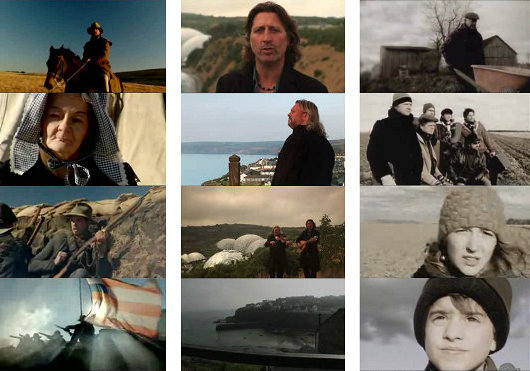
In South Africa, England, and Quebec, popular musicians have expressed regret over the rejection of their traditional cultures by the destructive onward march of modernity. The hugely popular song ‘De La Rey’, sung in Afrikaans by Bok van Blerk I have already explored in greater depth in an article for Norumbega, but ‘Roots’ by England’s Show of Hands and ‘Dégénération’ by Québécois group Mes Aïeux are worthy of notice.
‘Roots’, as one would expect from the title, decries the severing of the English people from their lyrical musical tradition and lifestyle, being replaced by “Indian, Asian, Afro-Celt”, while the song’s refrain evokes images of a people adrift: “Haul away boys let them go/ Out in the wind and the rain and snow/ We’ve lost more than we’ll ever know/ On the rocky shores of England”. In one verse, the song taps into a particular pet peeve of mine, the complete invasion of pubs by the dreaded television screen:
Is three folk singers in a pub near Wells
Well I’ve got a vision of urban sprawl
Pubs where no one ever sings at all
And everyone is staring at a TV screen
Overpaid soccer stars, prancing teens
Australian soap, American rap
Estuary English, Baseball cap
There is no greater killer of good conversation than the massive influx of television screens into the pubs. Just the other evening I was down in our regular in Bronxville and from my vantage point alone I could see three television screens. The bright technicolor projection of baseball, soccer, football, and rugby into an otherwise dark space is too great a distraction for the eye. Bad enough sitting in a booth, it is even worse having dinner at the bar when you do not at least have the advantage of sitting opposite your drinking companion. How much more of a good time it would be without those dazzling displays, and without the obnoxiously loud music, either piped in from the jukebox or else some third-rate band singing third-rate cover songs of third-rate rock groups. Bleccch! It is those moments when one yearns to be ensconced by the fire in the Russell on the Scores in St Andrews, either accompanied solely by a book and a solid pint, or engaged in the usual joviality with the after-Rosary crowd.
The Québécois song, meanwhile, laments the decline of the family from large in size and from tied to the earth to solitary and confined in the city. The name of the band — Mes Aïeux — means “My Ancestors” and ‘Dégénération’ is a play on words, meaning ‘degeneration’ but also soundling like ‘des generations’ — ‘of the generations’. The song opens:
Ton arrière-grand-père, il a labouré la terre
Et pi ton grand-père a rentabilisé la terre
pis ton père, il l’a vendu pour devenir fonctionnaire
Et pi toé mon p’tit gars, tu sais pu c’que tu vas faire
Dans ton p’tit trois et d’mi ben trop cher, frète en hiver
Il te vient des envies de dev’nir propriétaire
Et tu rêves la nuit d’avoir ton petit lopin d’terre
Your great-great grandfather cleared the earth
Your great-grandfather laboured on the earth
Your grandfather turned a profit from the earth
Then your father sold the earth to become a bureaucrat
Now you, my little man, you don’t know what to do
In your little 3 room apartment – too expensive and cold in the winter
You want something to call your own
And you dream at night of having your own little piece of earth.
The next verse goes on about the maternal line of the family: the great-great grandmother “had fourteen kids”, the next generation “had about as many”, the next “had three, that was enough for her” but “Your mom didn’t want any, you were an accident”.
Quand tu fais des conn’ries, tu t’en sauves en avortant
Mais y’a des matins, tu te réveilles en pleurant
Quand tu rêves la nuit d’une grande table entourées d’enfants
Now you, my little lady, change partners all the time
When you make a mistake you escape by aborting
But there are mornings you awake crying
When you dream in the night of a large table surrounded by little ones.
The song is one of the most popular downloads on iTunes Canada, and the band’s most recent album has gone double-platinum.
Music videos of ‘De La Rey’, ‘Roots’, and ‘Dégénération’ after the jump.
Sources Fides et Ardor: Sign of Hope – Mes Aïeux | Fides et Ardor: The People Speak (or sing…)
Previously: Breaking the Mold in Quebec | The Men Who Saved Quebec | Hitchcock in Quebec
The Mayoress of Cape Town
Die Burgemeester van Kaapstad
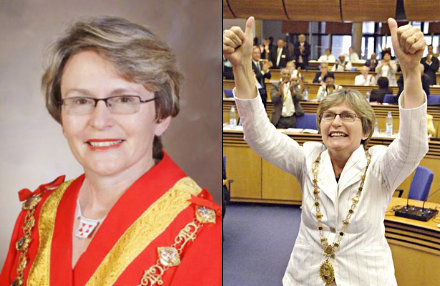
AND SO, Helen Zille, the Mayor of Cape Town, has been elected Leader of the Opposition in South Africa, a somewhat curious choice to head the country’s (liberal) Democratic Alliance against the current government (the ANC alliance of racial nationalists, the Communist Party, and the trade union confederation) as she is not actually a member of parliament and has stated that she has no intention of seeking election to that body. If only she would bring a little more reserve to the council chamber, a virtue she is sadly lacking (as evidenced in pictures above and below).
Ms. Zille has a reputation as a bit of a go-get-em mayor, and something of a pragmatist, which is welcome, as any efforts that chip away at the rule of the noxious African National Congress are wholeheartedly welcome. And she’d have to try hard to be any worse in her new job than her noxious predecessor, ‘Tony’ Leon. While we would probably vote (depending on geography) for the Inkhata Freedom Party or the Vryheidsfront, we wish Ms. Zille luck as Leader of the Opposition.
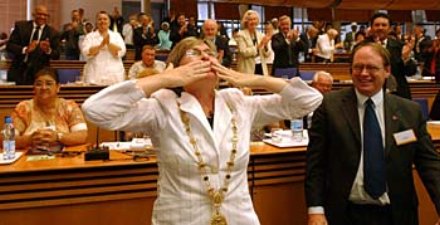
The Farm Killings of South Africa
The above video is a ten-minute portion of a South African news programme exploring the brutal killings of innocent farmers in that country. It is most certainly worth watching, with the caveat that it’s not for the faint of heart. It is astonishing that people can live in such a climate of violence and fear. “But with the Lord’s strength, I’m here,” says one victim.
Even more appalling once you’ve watched that video is to watch the video below of South Africa’s Safety and Security Minister, Charles Nqakula, attacking those who complain about the rise in rape and murder. “They can continue to winge until they are blue in the face, they can continue to be as negative as they want to or they can simply leave this country.” It doesn’t take a genius to understand that the ‘they’ he speaks of is the community of white South Africans. Plus ça change, eh?
Further along the theme of South African online videos, why not watch the trailer for the upcoming film ‘Catch A Fire’? Soon to be released by Focus Features, the film tells the true story of Patrick Chamusso, a man brutally tortured by the police while falsely accused of terrorism. He is freed when they realize he is innocent, but soon makes up for his innocence by, you guessed it, becoming a terrorist.
Search
Instagram: @andcusack
Click here for my Instagram photos.Most Recent Posts
- Christ Church December 29, 2024
- A Christmas Gift from the Governor December 24, 2024
- Oude Kerk, Amsterdam December 24, 2024
- Gellner’s Prague December 19, 2024
- Monsieur Bayrou December 18, 2024
Most Recent Comments
Book Wishlist
Monthly Archives
Categories

